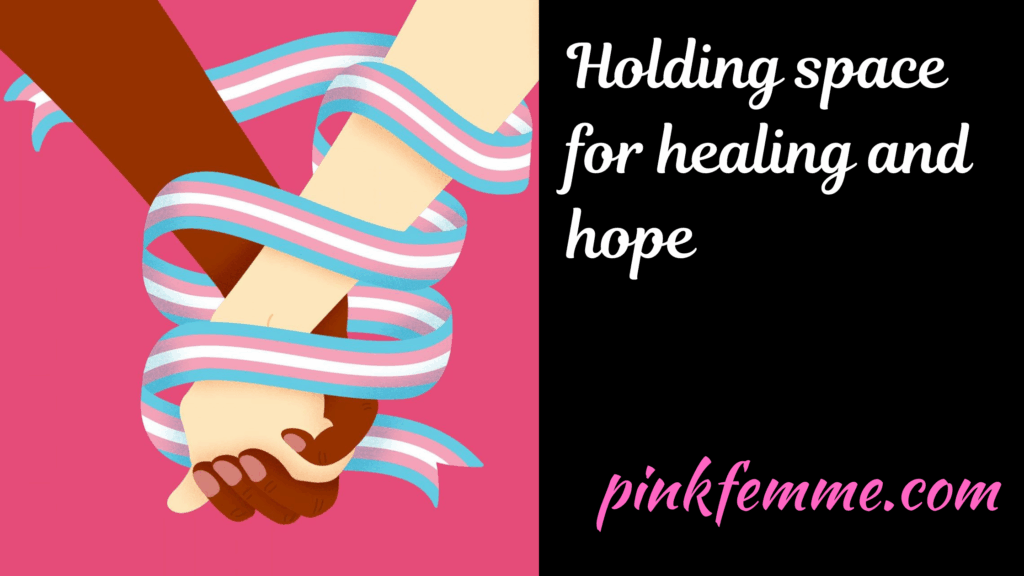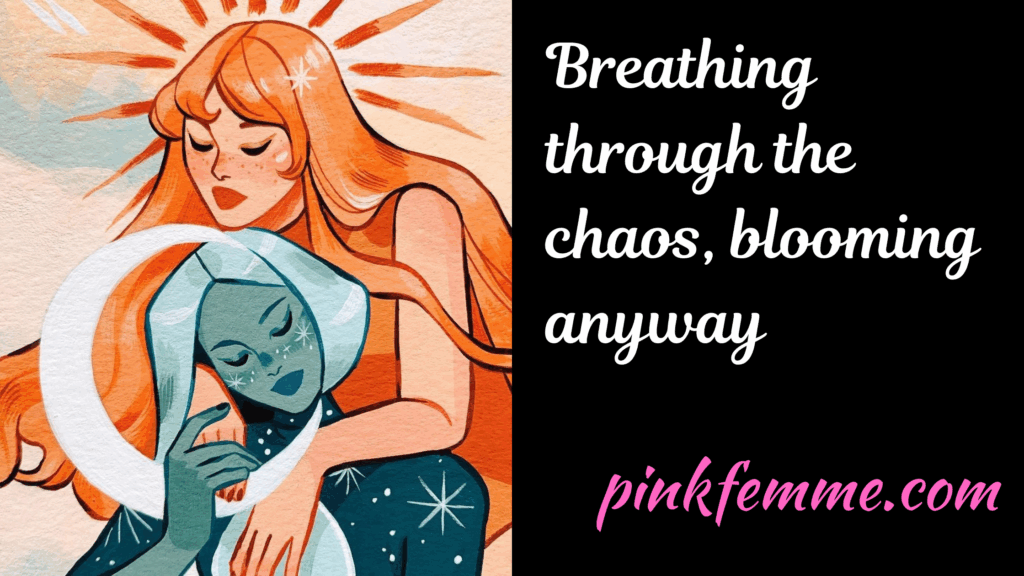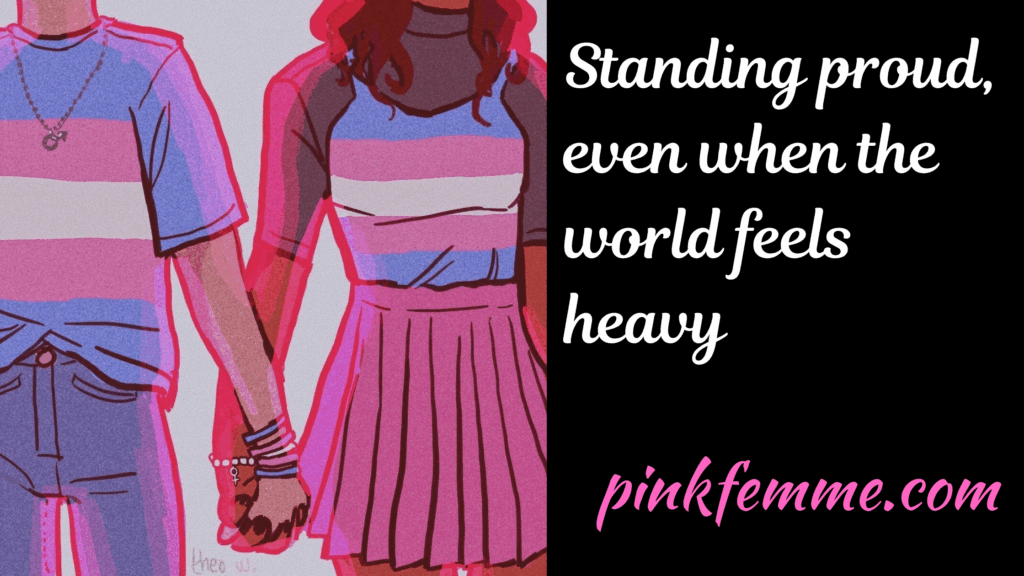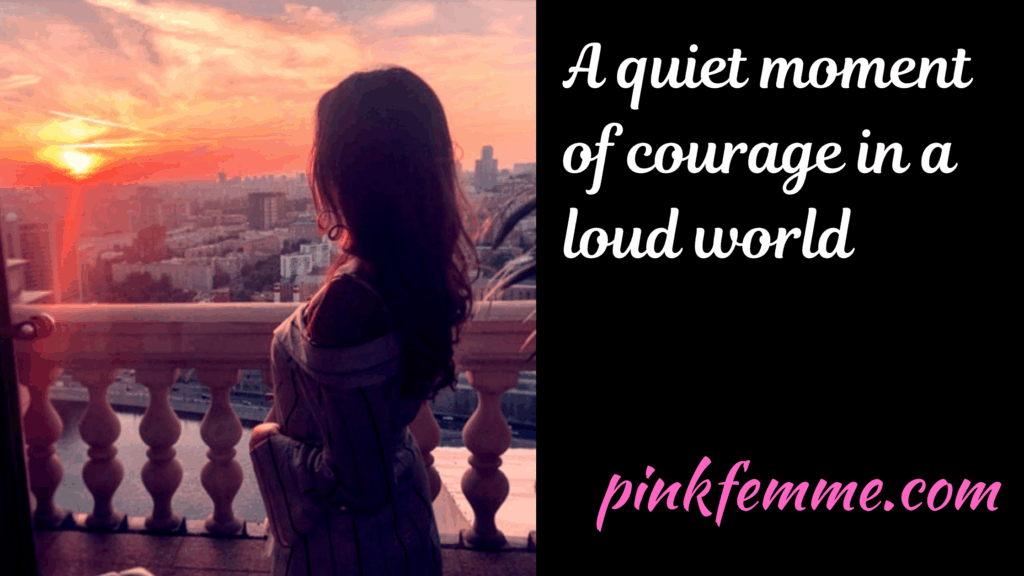
Lately, I’ve been seeing the emotional heaviness that comes from simply existing as a transgender person in a world filled with growing anti-trans legislation and rhetoric. Maybe you feel it too — that quiet ache in your chest, that weariness from trying to hold your head up high when the world keeps trying to push you down. I want to talk honestly about how these laws and the climate surrounding them affect our mental health — and, more importantly, how we can care for ourselves through it all.
Anti-trans laws can deeply affect mental health by increasing anxiety, depression, and emotional exhaustion. Understanding these effects and practicing intentional self-care can help protect your spirit and resilience in the face of ongoing discrimination.
Even though the world feels heavy right now, I promise you — there are ways to protect your energy, nurture your spirit, and remind yourself that you still matter. Let’s talk about how to recognize the emotional toll of this environment, and more importantly, what you can do to take care of yourself in it.
Feeling the Weight of the World
You don’t need to scroll through social media or turn on the news to sense it — the collective tension surrounding transgender lives is everywhere. It lingers in conversations, seeps into headlines, and hums quietly in the background of our daily lives. Even if you try to step away from the noise, it still finds its way in, like an invisible fog that drifts through the cracks of your peace.
There are moments when it feels like the entire atmosphere has changed — as if the very air has become heavier to breathe. You might walk through the world with your shoulders slightly tensed without even realizing it, carrying the invisible weight of being seen as “different” in spaces that should feel safe. It’s not always about someone saying something cruel or discriminatory; often it’s the subtle things — the sidelong glances, the hesitation in someone’s voice, or the way a conversation suddenly shifts when your identity becomes part of it.
Each of these small moments lands softly, but over time, they build. They collect in the body like bruises that no one else can see. And by the time you make it home, there’s this deep exhaustion — not just from your day, but from the emotional labor of constantly having to prove, justify, or protect your right to exist. It’s a kind of fatigue that sinks into your bones, leaving you yearning for quiet and safety.
When the world keeps questioning your validity, even in subtle ways, it chips away at your sense of belonging. You may start to feel detached, like you’re moving through life behind a thin pane of glass — visible but unseen, present but not fully acknowledged. That disconnection can slowly turn inward, manifesting as depression, anxiety, or a longing to pull away from everyone and everything just to catch your breath.
And I want you to know — that response is human. It’s not weakness. It’s your mind and body trying to protect you from the constant emotional friction of living in a world that doesn’t always embrace you as it should. Who wouldn’t want to retreat when each day can feel like another round of invisible punches?
Sometimes, even the smallest things — a negative headline, an offhand comment, a law passed hundreds of miles away — can feel like they’re happening to you personally. Because in a way, they are. They send a message, both subtle and loud, that your existence is up for debate. And that’s a burden no one should have to carry.
But please remember this: the heaviness you feel is not a sign that you’re broken or fragile. It’s evidence of your sensitivity, your empathy, and your awareness of the world around you — all of which are gifts. Feeling deeply doesn’t make you weak; it makes you beautifully human in a world that sometimes forgets how to feel at all.
When the Spirit Grows Weary
There comes a point when the noise, the headlines, and the constant tension don’t just tire you out — they start to seep into your soul. One of the most damaging effects of ongoing anti-trans rhetoric is that it doesn’t stop at wounding your emotions; it begins to erode your spirit. It’s a slow, almost imperceptible process, like a candle burning low. At first, you still feel its warmth and glow, but over time, you notice the light flickering, growing dimmer with each fresh wave of hate or exclusion.

It’s more than emotional exhaustion — it’s psychic fatigue. It’s that deep, inner weariness that whispers, “Why keep trying?” or “What’s the point?” It’s the heaviness that settles in your chest when you start to believe that the world has no room for your joy. I’ve felt it myself — those moments when it seems easier to shrink, to hide, or to simply stop showing up as fully as you once did. And yet, I also know that this weariness isn’t who we are; it’s what happens to us when the world forgets to see our light.
History has shown how systems of oppression often aim to do exactly that — to break people from the inside out. There are countless examples of this kind of spiritual annihilation, where people are stripped not only of their rights or safety but of their will to dream, create, or hope. It’s one of the most insidious forms of harm because once someone’s spirit is dimmed, everything else becomes harder: getting out of bed, finding motivation, believing in a future. That spark within us — the one that says, “I am still here, and I still matter” — is exactly what such cruelty seeks to extinguish.
But I refuse to let that happen — not to me, and not to you. Our spirits deserve to be nurtured and protected like sacred things, because they are. They’re the quiet fires that keep us moving forward when logic says we shouldn’t have to fight so hard just to exist. When our spirit grows weary, it’s not a sign that we’re weak; it’s proof that we’ve been strong for too long without enough rest, tenderness, or affirmation.
So when that inner light begins to fade, I try to imagine tending to it the way one might tend to a delicate flame — shielding it gently with cupped hands, giving it air, whispering to it kindly. Sometimes that means allowing yourself to cry, to rest, to disconnect from the world for a while. Sometimes it means leaning on a friend who reminds you who you are when you’ve forgotten. It can also mean creating small moments of beauty — lighting a candle, listening to music that feels like a hug, or writing words that only your heart will ever read.
Your spirit is the most precious part of you. It’s the part that still dreams, still hopes, still loves despite everything. No law, no rhetoric, no cruelty can take that from you unless you stop believing that your light matters. And I want you to know — it does. You matter. You always have. Even when the world grows dark, your existence itself is an act of quiet, radiant rebellion.
Remembering: This Will Pass
When the world feels heavy and cruel, it’s so easy to believe that it will always be this way — that the fear, anger, and exhaustion are permanent. But I want to gently remind you that this moment, no matter how dark it feels, is still just a moment in time. The tides of history are constantly shifting. The fight for transgender rights has always moved in waves — forward, backward, then forward again. Each setback has been followed, sooner or later, by a new surge of courage and visibility. And I truly believe that the same will happen again.
Right now, we may be standing in one of those deep valleys where the air feels thin and hope seems far away. But valleys are not permanent places; they are the low points between peaks. Every movement for justice in history has faced times like this — moments when it seemed as though progress had disappeared, only for it to return stronger, more determined, and more deeply rooted than before. What you are feeling is part of a much larger story, one that you are helping to shape simply by being here, by existing authentically in a world that still struggles to understand you.

Holding on to hope during times like these can feel almost impossible, especially when all you seem to hear is hatred or ignorance echoing through the airwaves. But what’s loudest isn’t always what’s most true. The voices of cruelty often shout the hardest because they are trying to drown out something even more powerful — love, truth, and progress.
Beyond all that noise, there are countless hearts who stand with you — some visible, some silent. There are people who use their platforms to speak up, and others who quietly challenge bias in their own families or workplaces. There are teachers creating safer classrooms, healthcare workers providing affirming care, friends offering gentle reminders that you are loved, and strangers who simply smile at you in solidarity. These moments may not make headlines, but they are happening every single day. They are the quiet proof that humanity is still moving in the right direction, even when it feels like it isn’t.
So when it feels unbearable, try to remember that we’ve been here before — maybe not in the exact same way, but in spirit. Our community has always been resilient, creative, and full of fire. The world changes because people like you refuse to give up, even when it hurts. Your existence alone is resistance. Your hope, even in small doses, is powerful.
One day, you’ll look back on this chapter and see that it wasn’t the ending — it was the middle of a story that was still unfolding. You’ll see how the strength you’re building now helped shape the brighter days ahead. And until that day arrives, I want you to keep this truth close to your heart: this pain, this fear, this uncertainty — it will pass. The sun will rise again for all of us, and when it does, we’ll stand taller than before, our spirits stronger for having made it through the storm together.
Recognizing the Effects on Your Mental Health
Sometimes the signs of emotional strain creep in quietly, almost without notice. You might find yourself waking up already exhausted, even after a full night’s sleep, or feeling a heaviness that makes simple tasks feel monumental. Maybe you’ve started avoiding certain conversations, skipping social events, or scrolling past stories that once inspired you — not because you don’t care, but because your heart feels too full, too bruised, to absorb one more painful thing.
If you’ve noticed your depression or anxiety deepening, or if you feel more withdrawn, more tired, or more hopeless lately, please know this: it’s not “just in your head.” These feelings are valid, real, and completely understandable given the constant wave of hostility and uncertainty surrounding us. Living in a world that questions your right to exist isn’t something anyone’s nervous system is built to handle gracefully. What you’re feeling is your mind and body’s natural response to prolonged stress, fear, and emotional vigilance.
When we exist in an environment that feels unsafe or invalidating, our brains slip into a kind of survival mode — scanning constantly for danger, replaying memories of rejection, and anticipating harm even before it happens. Over time, that hyper-awareness can turn into chronic anxiety, emotional numbness, or deep fatigue. You might find yourself feeling detached, irritable, or even ashamed for not being able to “handle it better.” But that’s the thing — you’re not supposed to have to “handle” this kind of constant pressure. No one is.

Recognizing what’s happening isn’t about labeling yourself as fragile — it’s about giving yourself the compassion you deserve. Awareness is the first act of healing. When you begin to notice these changes in your emotions, sleep patterns, appetite, or social habits, pause. Take a gentle inventory of what’s shifted. Maybe you’ve been avoiding people you love because you don’t have the energy to explain how you’re feeling. Maybe you’ve been pushing yourself too hard to appear “fine.” Whatever it is, notice it without judgment.
Remind yourself that these struggles are not reflections of your strength or your worth. They are reflections of a world that often makes it hard for you to rest, to feel safe, and to just be. When you recognize that it’s the world pressing on you — not a personal failure — something begins to shift. You start to reclaim your power. You can look at your pain and say, “This isn’t who I am. This is something I’m experiencing.” And that small shift in awareness is often where healing begins.
From there, you can begin to respond to yourself with kindness rather than criticism — by slowing down, by allowing rest, by reaching out when you need connection. Self-awareness doesn’t erase the pain, but it opens the door to gentleness, and gentleness is often the most radical act of self-care you can offer yourself when the world feels harsh.
Protecting Your Energy and Setting Boundaries
Self-care, in times like these, is not indulgence — it’s a lifeline. When the world feels loud and hostile, one of the most powerful acts of resistance you can practice is protecting your energy. Your attention, your emotions, and your peace are precious resources. You deserve to guard them with the same tenderness and loyalty that you would show to someone you love deeply.
The truth is, our nervous systems were never meant to absorb an endless stream of negativity. Every time we read another heartbreaking headline or scroll through a comment section filled with cruelty, we invite that energy into our bodies. It doesn’t just pass through us — it lingers, it piles up, and it starts to shape the way we feel about ourselves and the world. That’s why setting boundaries, both emotional and informational, is not avoidance — it’s protection.
If you notice yourself doomscrolling late into the night, or feeling an ache in your chest after reading yet another article about anti-trans legislation, that’s your body gently whispering that it’s had enough. You are allowed to stop. You are allowed to step away. Staying informed doesn’t have to mean staying immersed. Choose one trusted, balanced source for news, check it at specific times, and then give yourself permission to disconnect. You don’t owe your mental health to being constantly aware of every detail — awareness without balance only deepens the wound.
The same goes for social media. It can be such a double-edged sword — a space for connection and solidarity, but also a breeding ground for ignorance and hate. When you stumble across hateful comments or transphobic discussions, your first instinct might be to defend yourself or others. I understand that impulse deeply — it comes from a place of courage and dignity. But engaging with people who are committed to misunderstanding you rarely leads to healing. It only drains the emotional reserves you need for the people and moments that do deserve your presence.
So instead of pouring your energy into trying to change hardened minds, pour it back into nurturing yourself. Protecting your peace is not a sign of weakness — it’s wisdom. You have the right to choose peace over conflict, quiet over chaos, and softness over defensiveness.
You might also find it helpful to create personal rituals that help you reset after encountering negativity. Maybe that’s lighting a candle and taking a few deep breaths, or stepping outside to feel the sun on your face. Maybe it’s listening to music that reminds you of your strength, or wrapping yourself in a blanket and letting yourself simply be for a while. These gentle, grounding moments act like small emotional shields — reminding you that even when the world feels hostile, you can still create safety within yourself.
And boundaries aren’t just about media — they’re about people, too. If someone in your life constantly makes you feel small or invalidated, you don’t have to keep them close just because they’ve always been there. You have every right to distance yourself, to say “no,” to step back without apology. Surround yourself with those who see your light and reflect it back to you, not those who dim it.
Protecting your energy is one of the most profound forms of self-respect you can practice. It’s choosing to honor your peace, your softness, and your wholeness in a world that too often tries to fracture them. And every time you say no to what drains you and yes to what restores you, you are reclaiming power that was always yours to begin with.
Surround Yourself with Allies and Hope
You deserve to be surrounded by people and spaces that not only accept you, but celebrate you — people who see your light, speak your name with kindness, and remind you that you belong exactly as you are. We all need connection, especially during times when the world feels heavy. Having the right people around you isn’t just comforting — it’s healing.
Allies, both trans and cis, can be a lifeline of love and validation. These are the people who hold space for your truth without question, who listen when you need to talk, and who show up — not just in words, but in presence. Seek out friends who make you feel lighter after spending time with them, communities that feel like a deep breath after a long day, and conversations that leave you feeling seen instead of small.
Sometimes, allies appear in the most unexpected places — a co-worker who quietly corrects someone when they misgender you, a friend who walks beside you in solidarity at a rally, or someone who simply says, “I see you, and I’m glad you’re here.” These moments may seem small, but they are acts of love that stitch tiny pieces of hope back into your spirit. And when you find people like that, hold them close. They’re reminders that goodness is still very much alive in this world.
Connection doesn’t only come from people you know personally, though. There’s something profoundly healing about finding community online — following trans creators, advocates, and artists who use their voices to uplift and inspire. Their stories can become little beacons of light on hard days, proof that you are part of something bigger than yourself — a collective resilience that refuses to be erased. When you see others thriving, speaking truth, and creating beauty despite everything, it rekindles a sense of possibility inside your own heart.
Every morning, make a gentle choice to invite more light into your day. Listen to a podcast that leaves you feeling hopeful, or fill your space with music that makes your spirit sway. Read books by trans authors, watch films that affirm your identity, or follow social feeds that remind you of your strength and worth. Even the smallest things — a cup of tea in quiet sunlight, a walk in a safe space, a moment of laughter with a trusted friend — can refill you in ways you might not realize.
Think of it as emotional nourishment. Just as your body needs food to stay healthy, your heart and spirit need affirming experiences to stay strong. Every act of positivity you surround yourself with becomes a quiet act of resistance — a way of saying, “The world may be loud, but I choose love, connection, and hope.”
And remember, you don’t have to be relentlessly positive to be resilient. Some days, hope might just be a whisper — a flicker that says, “Maybe things can get better.” That’s enough. Even that tiny spark has the power to grow when it’s nurtured in the warmth of community and compassion. Surround yourself with those who remind you of that spark, and when you can, be that light for someone else too.
Because hope — when shared — multiplies. And together, we become not just survivors of this moment, but creators of a future that shines brighter for all of us.
Holding On to Your Spirit
Above all else, please don’t let this world extinguish your light. I know that at times it can feel as though your spirit is flickering — as if each day demands more strength than you have to give. But I want you to remember this: you are still here, and that is no small thing. Every time you wake up and choose to continue being yourself in a world that tries to make that difficult, you are doing something profoundly brave. You are proof that resilience can be quiet and gentle, not always loud or fierce, but steady — a heartbeat that keeps going no matter what storms around it.
Your spirit is sacred. It is the part of you that dreams, that feels joy, that still reaches toward love even after being hurt. Protect it with tenderness. Feed it with moments of beauty and connection. There will be days when your strength feels fragile, and that’s okay — even the softest light still shines. Sometimes, holding on doesn’t mean being fearless; it means giving yourself permission to rest, to cry, and to come back to life slowly.
If you ever need a place to release what’s heavy inside you, please reach out. My platform — and my heart — exist to hold space for you, without judgment or expectation. You can share your thoughts, your pain, your hope, or even just a sigh of exhaustion. You don’t have to edit yourself here. Sometimes just being able to speak your truth — even through a simple message — is enough to help your spirit breathe again. And when you share, you’re also reminding someone else that they aren’t alone in what they’re feeling.
Let’s keep showing up for one another — gently, consistently, lovingly. Let’s continue to be mirrors that reflect back each other’s worth when the world tries to convince us otherwise. We need one another now more than ever, not in a way that demands perfection, but in a way that says, “I see you, even when you’re tired. I’m still here.”
Even in the darkest times, we still belong. We still exist. And we will make it through this together — not by denying the pain, but by walking through it side by side, hands extended, hearts open. One kind word, one supportive message, one reminder that our spirits cannot be silenced — these are the threads that hold us together.
So please, hold on to your spirit fiercely, but also gently. Let it rest when it needs to. Let it be nourished by connection, by laughter, by small glimmers of joy that the world cannot take away. You are a part of something vast and unbreakable — a collective of souls who refuse to disappear. And no matter what happens next, your light will continue to shine — beautifully, defiantly, and entirely your own.
If you are looking for more lifestyle-related posts here on Pink Femme, you can find them all here.
If you enjoy reading transgender coming out stories or romance stories with a trans-positive element, take a look at my author page on Amazon where you will find all the novels that I have published so far.
Keep up to date with all my latest femme news with the fabulous Pink Femme Newsletter. Each Monday you’ll receive an email from me that will include a chapter from the novel that I am currently writing. I will also alert you to interesting information from articles that have not yet been published on Pink Femme. The Pink Femme Newsletter is the only place to see chapters from the novels before they are published. Sign up today: PINK FEMME NEWSLETTER.
Thank you for your visit to the Pink Femme website. I’m determined to keep all of the valuable information on here free for anyone to access. No pay-walls. That said, if you are able to help keep the lights on, so to speak, I would really appreciate your support. Here is the Pink Femme Patreon page with a really cheap support tier. Every little bit helps to cover the costs of keeping Pink Femme alive on the internet. Hugs to all of you.
When it comes to my choices for makeup and beauty products, I only use L’Oréal Paris (Available on Amazon). I have really sensitive skin and never once have I had any negative reaction to any L’Oréal product.
References
- Hendricks, M. L., & Testa, R. J. (2012). A Conceptual Framework for Clinical Work With Transgender and Gender Nonconforming Clients: An Adaptation of the Minority Stress Model. Professional Psychology: Research and Practice, 43(5), 460-467. ([Trans Reads])
- Meyer, I. H. (2003). Prejudice, Social Stress, and Mental Health in Lesbian, Gay, and Bisexual Populations. Psychological Bulletin, 129(5), 674-697. ([PMC])
- “Minority stress theory: Application, critique, and continued relevance.” (2023). PMC (Open Access Review). ([PMC])
- Price, M. A., et al. (2023). Structural transphobia is associated with psychological distress among transgender adults. (Open access) ([PMC])
- Restar, A. et al. (2024). Antitrans Policy Environment and Depression and Anxiety Symptoms in Trans Adults. JAMA Network Open. ([JAMA Network])
- Tebbe, E. A., & Moradi, B. (2021). Moderating Effects of Antitrans Legislative Efforts on Trans Mental Health: A Minority Stress Framework. (PMC Open Access) ([PMC])
- “Review: Minority stress and mental health in European transgender and gender diverse individuals.” (2023). European Journal of Social Psychology / relevant review. ([ScienceDirect])
- “Gender Minority Stress and Health Perceptions Among Transgender and Gender Nonconforming Individuals.” (Open access article) ([PMC])
- “Gender minority stress, mental health, and relationship quality.” (PMC) ([PMC])
- American Psychological Association (APA). APA Statement on Access to Treatment for Gender Diverse People. (2025) — supports evidence-based psychological care and stresses the harm caused by denying mental health support. ([updates.apaservices.org])
